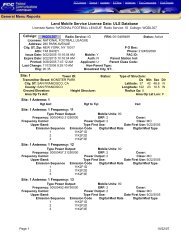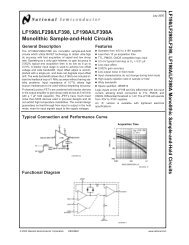You also want an ePaper? Increase the reach of your titles
YUMPU automatically turns print PDFs into web optimized ePapers that Google loves.
IP number (for example Ox7FOOOOO I is 127.0.0. 1). So how do we convert the result in host->h3ddr<br />
given by gethostbyname(3)? Easy, we'll just cast the host->h_addr with *(long *)(host->h_addr). Fi<br />
nally, don't fo rget to use the htons(3) to convert it to revers byte order on x86. And the addrlen argu<br />
ment is just sizeof(sockaddr). We will have to cast our sockaddr_in variable to a sockaddr struct when<br />
passing it to connect(2). And of course, one final thing, don't forget to close down your socket. Use<br />
close(2) with your socket as argument. Like: close(s) (The definition of close(2) is found in<br />
.)<br />
Writing The Code<br />
Now when your fingertips are itching to get down to business don't let me hold you back. Yo u<br />
should without problem be able to write a portscanner or anything else - only your imagination sets the<br />
limit. No guide is complete without that final piece of source code, so here it is:<br />
portscan. c<br />
#include <br />
#include <br />
#include <br />
#include <br />
#include <br />
#include <br />
#include <br />
#defi ne START<br />
#define STOP 1024<br />
void main(int argc, char " argv) {<br />
tnt 5,port;<br />
struct hostent 'host;<br />
struct sockaddr_in victim;<br />
printf("PortScan v1.0 - By darknite[@kurir.net]\n");<br />
printfC"For his socket-programming article in 1998\n");<br />
if (argc
















